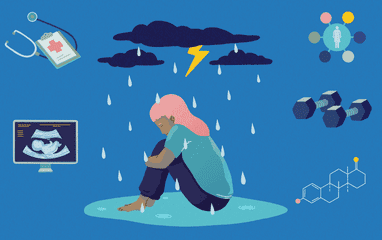 Genetic factors
Genetic factorsThere is good evidence that genetic factors, especially melancholic depression, psychotic depression and bipolar disorder, play an important role in the predisposition of a person to develop depression. No single gene, but rather a mixture of genes, is likely to be responsible.
It is possible to inherit the predisposition to experience depression. If a biological parent has been diagnosed with the condition, the genetic likelihood of developing psychiatric depression is around 40 percent, with the remaining 60 percent being attributed to factors within the individual's own climate. Without traumatic life events, depression is unlikely to occur, but the probability of experiencing depression as a result of such an occurrence is highly influenced by genetics.
Biochemical factors
Our understanding of the human brain is still relatively small, so we don't really know what really causes depression in the brain. It is possible that the role of neurotransmitters is impaired in most cases of clinical depression. The chemicals that bring messages from one part of the brain to the next are neurotransmitters. Similar functions are fulfilled by multiple neurotransmitters. Three significant ones that influence the mood of an individual, however, are serotonin, noradrenaline and dopamine.
Neurotransmitters interact with a sequence of nerve cells in normal brain activity, with the signal being as high in the second and subsequent cells as it was in the first. However, mood controlling neurotransmitters struggle to act normally in people who are stressed, so that the signal is either depleted or interrupted before moving to the next nerve cell.
Physical illness
In a simple sense, through the diminished mood that we will all feel while we are unwell, in pain or discomfort, confined and less capable of doing the things we love, physical illness can lead to depression.
Disease may also alter the functioning of the body in a way that contributes to depression. We may all suffer from depression, even though the disease doesn't make us feel down.
The brain's aging
As we age, the general functioning of our brain can become impaired and this can influence the channels of neurotransmitters that affect the state of mood.
Gender
Sex is a partial but incomplete explanation of why depression may grow in individuals. Melancholic depression is developing in equal numbers of men and women. Studies have shown, however, that there is a far greater risk that women will experience non-melancholic depression than men.
Stress
It is important to remember that certain events will stress almost any person and depress them. Within days or weeks, most people get over stress or depression, while others don't.
Personality
Our research has shown that people are more at risk of developing depression than those with the following personality styles. Those that are high on the first four variables are at a far higher risk of depression.









